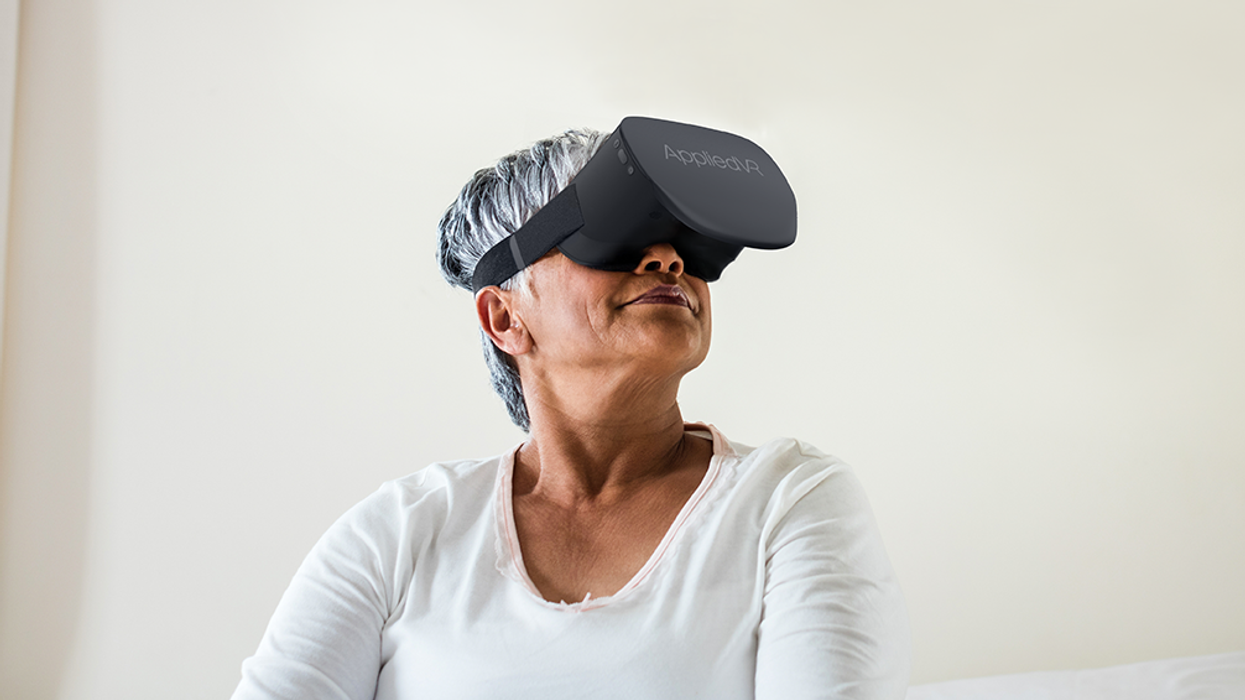AppliedVR Raises $36 Million to Combat Chronic Pain Without Opioids
Keerthi Vedantam is a bioscience reporter at dot.LA. She cut her teeth covering everything from cloud computing to 5G in San Francisco and Seattle. Before she covered tech, Keerthi reported on tribal lands and congressional policy in Washington, D.C. Connect with her on Twitter, Clubhouse (@keerthivedantam) or Signal at 408-470-0776.

When Matthew Stoudt co-founded AppliedVR in 2015, few were talking about using virtual reality as a way to treat pain.
Now, the Los Angeles-based startup is awaiting approval from the Food and Drug Administration for one of its signature products to manage chronic lower back pain through its VR platform, and aims to ease people off high doses of opioids.
AppliedVR got a boost this week, raising $36 million in Series B funding. Investors included health care-focused firms F-Prime Capital and JAZZ Venture Partners. The funds will go to hiring and moving the company's suite of VR products through the FDA pipeline.
But Stoudt has even broader ambitions.
"If we can get a device planted in every patient's home, then you can use that as a way to start dispensing a broader variety of immersive therapeutics," Stoudt said.
AppliedVR takes a rather unconventional but well-studied approach to pain that relies more on manipulating brain function rather than dulling the sensation of pain. Pain, like any other sensation, is simply a feeling the brain interprets as "painful."
By forcing the brain to experience other sensations, the painful feeling can be drowned out, or reduced.
"It can be used for anxiety or depression, for sleeplessness," he said "There are opportunities to use it as a tool for creating more powerful group therapy. It could be used as a communications device for a doctor to have a one on one consultation where the patient doesn't even need to leave the comfort of their home."
AppliedVR is the first company to receive an FDA Breakthrough Device Designation as a VR treatment therapeutic for treatment-resistant fibromyalgia and chronic intractable lower back pain. That's a key step in getting FDA approval and wider adoption among doctors and insurers. And it comes as a clutch of other companies look to VR to treat everything from lazy eye to Alzheimer's.
AppliedVR has used this pain reduction principle in a variety of applications: Cedars-Sinai Los Angeles used its now-shuttered VR labor device to reduce labor pains in pregnant patients successfully, opening the door for opportunities to give birth without pain medication.
Children's Hospital Los Angeles used AppliedVR to soothe young children while they were getting blood drawn, which could help children with chronic conditions develop a more positive relationship with the hospital and with treatment.
"The likelihood of virtual reality literally completely turning off pain receptors, especially to the degree that they're activated during labor, is probably unlikely," said Dr. Melissa Wong, maternal-fetal medicine specialist at Cedars-Sinai Los Angeles who led the study using AppliedVR's labor device. "But what people consistently said was that they knew the pain was there, it just didn't bother them as much."
The company has three VR platforms currently in the FDA pipeline: EaseVRx for people with chronic lower back pain, the opioid-sparing RelieVRx for those dealing with acute pain post-operation, and AnxietyVRx for people with generalized anxiety.
But Stoudt sees the future of AppliedVR as a "Pharmacy of VR", a term coined by Dr. Brennan Spiegel at Cedars-Sinai Los Angeles to mean a VR treatment or program for every illness or injury.
- Tripp Raises $11 Million to Simulate Psychedelic Euphoria - dot.LA ›
- VIrtual Reality Could Be the Future of Pain Management - dot.LA ›
- AppliedVR Made a Virtual Experience to Reduce Chronic Pain - dot ... ›
- AppliedVR's Virtual Pain Therapy Platform Gets FDA Approval - dot.LA ›
- SpCal VR Therapy Progresses to be Covered by Medicaid - dot.LA ›
Keerthi Vedantam is a bioscience reporter at dot.LA. She cut her teeth covering everything from cloud computing to 5G in San Francisco and Seattle. Before she covered tech, Keerthi reported on tribal lands and congressional policy in Washington, D.C. Connect with her on Twitter, Clubhouse (@keerthivedantam) or Signal at 408-470-0776.




 Image Source: Skyryse
Image Source: Skyryse
 Image Source: Northwood Space
Image Source: Northwood Space